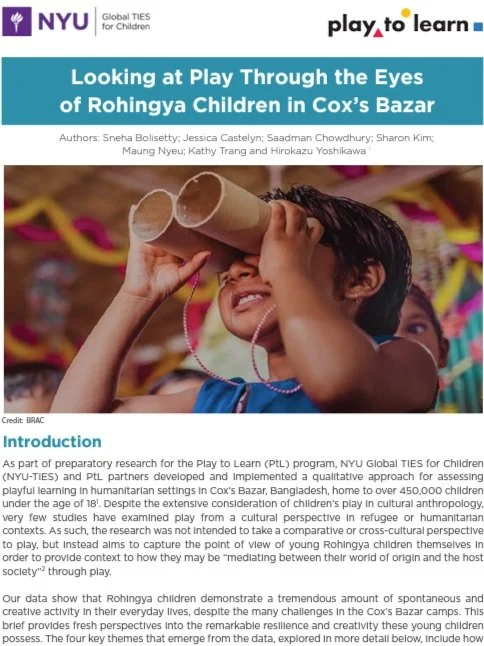Play to Learn Process & Pilot Findings
Overview
Our team has produced several briefs that, collectively, highlight key 1) lessons from the process of doing large-scale research with Rohingya and host communities living in Cox’s Bazar, Bangladesh and 2) findings from pilot data collected prior to the launch of our studies. See how much we learned, and what it means for research in these contexts.
Community Engagement for Early Childhood Development Programs: Perspectives of the Rohingya and Other Stakeholders in Cox’s Bazar
This brief discusses the importance of participatory research, the process of running a participatory workshop, and reflections on how the data generated is of particular value to humanitarian implementers. In addition to informing program delivery, a broader goal of this work is to contribute to understanding both the “how” of participatory research methods (what goes into them, how they can be organized) and the “why” behind them (the benefits of multi-method approaches and community engagement as key research strategies).
Developing and Implementing a Measure of Quality of Home Visit Interactions for Fathers: the Rohingya Camps and Host Communities in Cox’s Bazar, Bangladesh
This brief discusses the importance of measuring quality, the process of developing and implementing this quality instrument, and the preliminary analysis of data collected using it. In addition to informing the impact evaluation, a broader goal of this work is to contribute to the emerging knowledge on measuring program quality and fidelity, particularly in low and middle income countries (LMIC) and emergency contexts, and better understand “how” and “why” parenting programs in these contexts do or do not work.
Fathers’ Perceptions of Play: Evidence from the Rohingya Camps
This brief in our series presents preliminary findings collected as part of the pre-pilot and pilot phases of one of our Play to Learn impact evaluations and a longitudinal study. The impact evaluation, led by NYU-TIES, investigates BRAC's flexible, hybrid home-visiting program in Cox's Bazar which seeks to engage fathers as well as mothers and the longitudinal study features three-cohorts from prenatal and birth which follow young Rohingya children through their first years of life. The data in this brief looks specifically at Rohingya fathers' perceptions of play.
Looking at Play Through the Eyes of Rohingya Children in Cox’s Bazar
This brief in our series aims to capture the point of view of young Rohingya children in order to provide context to how they may be mediating between their world of origin and the host society through play. Our data show that Rohingya children demonstrate a tremendous amount of spontaneous and creative activity in their everyday lives, despite the many challenges in the Cox's Bazar camps. This brief provides fresh perspectives into the remarkable resilience and creativity these young children possess.
Delivering Quality Research - Lessons from Large-Scale Pilot Research in Cox’s Bazar
The brief outlines the process and strategies used as we piloted multiple data collection tools that were being considered for use in several large-scale research studies with the Rohingya in Cox's Bazar. This brief aims to provide context and a path forward for future researchers to deliver quality research in this, and other, complex research environments with the ultimate goal of informing the types, design, and delivery of services to support families and foster resilience in these contexts for generations to come.
Testing Measures of Refugee Camp Environment … Among the Rohingya in Cox’s Bazar
This brief shows that through analyses of instruments measuring caregivers' perceptions of refugee camp environment, caregiver mental health, and children's social-emotional development, there are reasons for optimism using these particular scales with the Rohingya community in Cox's Bazar, Bangladesh. Results suggest that the measures examined showed internal reliability, were adaptable for this context and associated in meaningful ways. This brief also shares the steps involved in selecting, adapting, and testing these scales to prepare them for large-scale use.
Measuring Rohingya Children’s Development: Cultural and Contextual Adaptation of IDELA
This brief describes our rapid iterative process of cultural, linguistic, and contextual adaptation and extension of child assessment tools for Rohingya Children in Cox's Bazar, Bangladesh. We outline three examples of our rigorous, culturally responsive, equity-based approach to adaptation and highlight some of the pilot studies' most critical findings using an extended IDELA (IDELA-E). Results suggest that IDELA-E is responsive to the environment in which the Rohingya children grow up and captures their learning and development gains across multiple domains.
Understanding Settings for Early Childhood Socialization: Evidence from the Rohingya Camp
The final brief demonstrates the utility of rapid ethnography to understand the socialization context of Rohingya children living in Cox’s Bazar Camps, where factors such as economic instability, natural disasters, and the Covid-19 pandemic have continued to change the individual- and family-level environment for Rohingya communities. Results from rapid ethnographic data in conjunction with in-depth parent interviews highlight several key elements contributing to the socialization of young Rohingya refugee children.
Play to Learn
Play to Learn is an innovative large-scale initiative from Global TIES for Children, the LEGO Foundation, Sesame Workshop, BRAC, and the International Rescue Committee that harnesses the power of play to deliver critical early learning opportunities to children and caregivers affected by conflict and crisis. Through Play to Learn, we work with our partners to evaluate early childhood development (ECD) programs in the Cox’s Bazar camps in Bangladesh with the Rohingya and in parts of Colombia with Venezuelan refugees. In addition, we are conducting a longitudinal prenatal birth cohort study with the Rohingya living in the Camps and neighboring host community members to understand the many factors that influence child outcomes.















